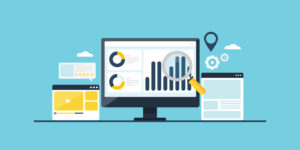SEO vs. PPC: How They Differ and Which Is Better For Your Small Business?
SEO vs. PPC: How They Differ and Which Is Better For Your Small Business?
SEO and PPC can be complex, with a lot of moving parts. They combine a large number of tools and best practices that are constantly evolving and changing. To best break it down so it’s easier to understand, let’s cover them both individually first.
What Is SEO?
SEO stands for search engine optimization, which is the process of increasing the quantity and quality of traffic to your website or a page on your site through search engines so you can rank higher in search engine results. 
The goal for any business is make it to the top of the list on the search engine results, and with SEO, you can do that through unpaid, organic searches. But how? There are several key factors to consider if you want to be successful with your SEO.
-
Effective, Relevant Keywords
Targeted keywords are keywords – or phrases – that your audience is actively searching for. According to Search Engine Journal, your SEO content won’t reach the right audience if you don’t optimize it with specific, targeted keywords. You should know who your audience is, what information they need and how you can give it to them, why they may need that information, and what keywords they’re searching for in order to find it.
-
Mobile-Friendliness
According to Statcounter, as of 2021, 55.4% of people access the internet from their mobile devices. Considering 10 years only 5% of people accessed the internet from their mobile devices, we’ve come a long way. Making sure your website is mobile-friendly is essential to your SEO success.
-
High-Quality Content
High-quality, engaging content helps fuel SEO. If you want your content to rank on search engines, it needs to be beneficial for your readers. With over 6.7 billion searches on Google each day, this is a very important practice to adopt.
-
Optimized Content
While high-quality content is important, optimized content is equally important. Your content must be written in a way that it can reach the largest possible audience within your target demographic. Ways to do this include using the right keywords, adding meta and title tags to each blog post, inserting relevant links and formatting your content to be featured in snippets.
-
Site Security
A secure website not only builds customers trust in you, but it’s also good for your business – and your SEO. An unsecure site makes your site harder to find because people are less likely to engage with it.
-
Page Load Speed
Even if you have a good website, it doesn’t matter if it doesn’t load fast enough. According to Think with Google, 53% or more users will abandon your page if it takes over 3 seconds to lead.
-
Meta Descriptions
Meta descriptions, or meta tags, directly impact how your website appears on search engine results – and also the likelihood someone may click through to your site. Essentially, it is your opportunity to advertise why someone should clickthrough and read that page.
-
URL Structure
The way your URL is structured can improve the user experience, as well as your SEO rankings. When structuring your URLS, you want to be consistent and organized, prioritize trustworthiness above all else, be concise so your URLs are easy to read and share, and avoid the use of special characters.

What Is PPC?
PPC stands for pay-per-click, which is a form of advertising where you pay for each click to your website. Businesses who use PPC are essentially buying visits to their website, instead of trying to achieve organic results. PPC advertising is most commonly used to:
- Generate leads quickly
- Increase sales
- Promote brand awareness
Small businesses use PPC to help drive traffic to their website quickly. Different types of PPC ads include:
-
Paid Search Ads
This is the most common ad you’ll see in search engine results. It’s otherwise known as the ads you see at the top and bottom of search engine results.
-
Display Ads
Contrary to paid search ads, which appear on Google, display ads appear on Google’s partner sites. The biggest benefit of display ads is their ability to target a specific audience, so you can show your ad only to those who would be interested in your business.
-
Social Ads
Social ads, which appear on social media sites, have the same benefits as display ads – their ability to target a certain group of people based on their interest in certain topic, demographics, and more.
-
Remarketing Ads
Have you ever wondered by ads pop up for that lawn mower you were researching the other day? There’s a name for that – and it’s called remarketing ads. These ads give businesses the chance to re-engage with people who have already shown some interest in your products and services. Creepy or genius?
-
Local Service Ads
These ads are exclusive to just the home services industry. They are open to a few niche markets that include businesses like plumbers, HVAC companies, electricians, and garage door companies. They assist in driving local people to your business, by showing your company at the top of your search engine – even above paid ads.
How Do SEO and PPC Differ?
So the burning question of the day is: how do SEO and PPC differ? To put it simply, PPC are paid ads that appear at the top of the search engine results page (SERP), above the organic listings that are influenced by SEO. Traffic from organic results (SEO) is free, whereas traffic from paid results (PPC) has a cost per each click. There are several major differences between the two that we break down below:
- Cost
- SEO: The cost of SEO is free unless you pay someone to help you with your SEO.
- PPC: You pay only when people click on your ad. However, your growth is tied directly to your budget.
- Website Traffic
- SEO: Organic traffic continues as long as you’re ranking high on search engine results.
- PPC: These ads have the potential of getting more clicks, which means you will pay more.
- Conversion Rates
- SEO: It’s better than traffic from social media, but still not better than PPC traffic.
- PPC: If your keywords are highly optimized, then you’ll generate more conversions but you’ll also end up paying more.
- Time
- SEO: Takes more time to achieve but once you do, the results are long-lasting after the fact.
- PPC: Brings faster results but when you stop paying for clicks, your traffic will also end.
Which Is Better For Your Small Business?
While they both differ in many ways, both SEO and PPC provide potential for your small business. In fact, the best marketing strategy you can have for your business involves a healthy combination of the two. They often times work together to drive business and sales and create the best results when used hand-in-hand. Each business has different needs, budgets, and goals. That being said, there’s not a one-size-fits-all approach to deciding if SEO or PPC will work better. If you work with a marketing agency, however, they can help in deciding the best move forward based on your needs, budget, and goals.
combination of the two. They often times work together to drive business and sales and create the best results when used hand-in-hand. Each business has different needs, budgets, and goals. That being said, there’s not a one-size-fits-all approach to deciding if SEO or PPC will work better. If you work with a marketing agency, however, they can help in deciding the best move forward based on your needs, budget, and goals.


